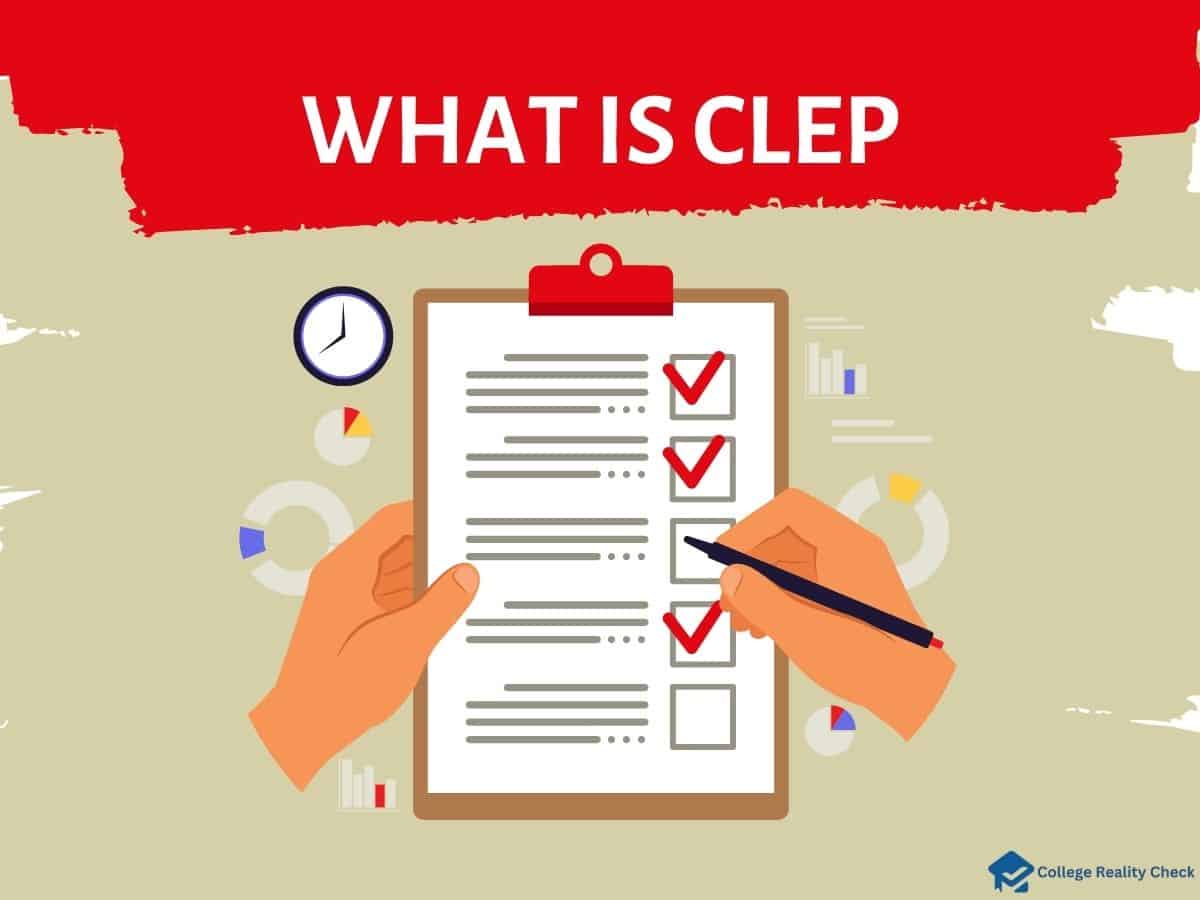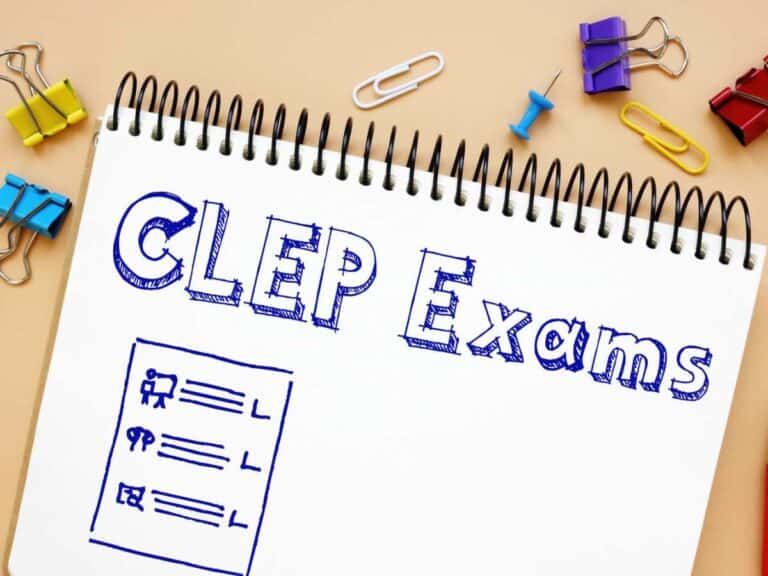What is CLEP? How CLEP Saves on Tuition
CLEP stands for College-Level Examination Program. It’s a standardized test that allows students to receive college credit for subjects they already know, thereby making college shorter and cheaper.
Unlike the SAT and ACT, CLEP is used primarily for giving degree-seeking individuals the opportunity to earn college credit and not for increasing their admissions chances. Besides high school students, CLEP can also be taken by college-level students, adult learners, and professionals who want to continue their education.
Below, we will discuss just about everything you need to know about CLEP.
Is CLEP Important for College Admissions?
CLEP is not important for college admissions in that admissions officers do not take it into account when deciding whether or not to accept an applicant.
However, it’s important to earn college credit where accepted, which can be beneficial for degree-seeking students who like to skip introductory college courses and save both time and money in the process.
Do You Have to Take CLEP?
High school students, adult learners and professionals who like to attend a particular college that accepts CLEP are not required to take any CLEP exam.
However, taking it allows them to earn college credit, the number of which can vary based on their CLEP scores as well as the CLEP policy of the institution of higher education.
Can Colleges See How Many Times You Took CLEP?
Colleges and universities cannot see how many times an applicant took a particular CLEP exam. Similarly, they cannot see an individual’s CLEP score unless he or she pays for the score report to be submitted to the postsecondary institution of choice.
They can see it, too, if the student agrees on the exam date to send his or her score to a college upon availability.
What is on CLEP?
A CLEP exam contains questions that have something to do with a particular discipline — test-takers can choose from a total of 34 CLEP exam topics that can be categorized into the following groups:
- Business
- Composition and literature
- History and social sciences
- Science and mathematics
- World languages
How Many Sections are on CLEP?
The sections on CLEP exams can vary from topic to topic. For instance, Calculus is made up of 2 sections, with a total of 44 questions.
On the other hand, German Language Level 1 is composed of 2 sections. There are also certain CLEP exams that are not divided into different sections, such as Introductory Business Law, which has a total of 100 questions.
How Many Questions is CLEP?
The number of questions a CLEP test has depends on the exam topic. However, on average, the number of questions CLEP test-takers have to answer is $93.
Some exam topics have fewer than 90 questions such as Calculus (44 questions), while others have more than 90 questions such as French Language Levels 1 and 2 (121 questions each).
Students taking CLEP will encounter different question formats.
For instance, most CLEP questions are multiple-choice questions. But there are also those that come in audio format. In a few, we will talk about this matter more, so keep reading!
What Kind of Math is on CLEP?
The CLEP Mathematics exam covers math topics essential for college-level coursework, and they include geometry as well as pre-algebra and algebra.
There are a few other math topics covered by the standardized test, although they come in the form of separate examinations that students can take instead of simply being topics covered by the Mathematics exam of CLEP.
Below, you will come across the different CLEP exams under the mathematics category:
- Calculus
- College Algebra
- College Mathematics
- Pre-Calculus
Is There Science on CLEP?
Technically speaking, unlike the ACT, which is another standardized test, CLEP doesn’t have any science section. However, there are CLEP exams that cover hard science topics, and they are biology, chemistry and natural sciences.
CLEP test-takers sit for specific areas of study and not for various disciplines on a single test date as with some other standardized tests.
Other than the hard sciences mentioned above, there are also CLEP social science exams such as the following:
- Human Growth and Development
- Introduction to Educational Psychology
- Introductory Psychology
- Introductory Sociology
- Social Sciences and History
Is There Writing on CLEP?
There is no CLEP writing exam topic, such as the Evidence-Based Reading and Writing (EBRW) section of the SAT, which is a college entrance exam. However, some CLEP tests have sections where test-takers are required to write essays.
As a matter of fact, the College Composition exam includes 2 mandatory essays that students have to compose.
Some CLEP exam topics include essay/s that test-takers must write as they are designed to measure an individual’s ability to write clearly and effectively, which is crucial for the discipline of their choosing.
How Does CLEP Work?
CLEP is a computerized standardized test for college credits.
Taking an average of 90 minutes to complete, CLEP exams are administered at test centers such as high schools and colleges as well as independent testing venues and military bases.
It’s also possible to take CLEP examinations online through remote proctoring.
What Does CLEP Measure?
CLEP is designed to measure a test-taker’s knowledge and proficiency of college-level material, which then allows him or her to earn college credit, depending on the score and a postsecondary institution’s CLEP policy.
Available CLEP exam topics are introductory-level courses, which can usually be covered in college classes in 1 semester.
At its core, CLEP exams are taken for the individuals who sit for them to demonstrate how much they know about the topic of their choosing, whether for entering college for the first time or for continuing education purposes.
Is CLEP Multiple Choice?
The vast majority of CLEP exam questions are multiple-choice questions, which means students have to choose the answer to every multiple-choice question from the 5 given choices.
However, some CLEP exams have essay components. There are also various language CLEP tests with listening sections whose multiple-choice questions are in audio format.
Is CLEP a Standardized Test?
CLEP exams are standardized tests because individuals who take them, no matter if young students, adult learners or professionals, have to answer the very same set of questions. Likewise, their performance is graded similarly.
As a result, over 2,900 American colleges and universities use CLEP to assess the proficiency of applicants in various areas of study.
When Do You Take the CLEP Test?
Individuals who like to take CLEP exams may do so no matter the year level in high school or even college or how long they have been a part of the workforce or as professionals. However, those who are below 13 years old are not allowed to sit for CLEP tests. CLEP is administered all year round, except during system maintenance dates.
Test-takers may also register for CLEP at any time they want, although they must take the test within 6 months.
How to Guess on CLEP
The best way to guess on CLEP is through the process of elimination.
This means that students should look for the wrong answers instead of the right ones among the answer options. Since there are 5 answer options, eliminating 1 wrong answer means an increase in guessing the right answer from 20% to 25%.
Since there’s no penalty for wrong answers, test-takers should answer each question even if they don’t know the answer.
However, individuals who are planning on registering for CLEP exams should know that not all questions are multiple-choice kinds, which is why it’s a good idea for them to go for exam topics they are highly familiar and confident with.
How Long is CLEP?
Most CLEP exams are 90 minutes long. The amount of time students are given to complete the examination will depend on the number of questions, difficulty level and components of the CLEP test.
For instance, since the College Composition exam consists of 50 multiple-choice questions and 2 essays, test-takers are given 125 minutes to answer everything.
The College Board has a list of all available CLEP exam topics and some important details about them that test-takers might want to know about, including each one’s total testing time.
How Does CLEP Scoring Work?
CLEP scores range from a minimum of 20 to a maximum of 80. Initially, the College Board obtains a test-taker’s raw score, which is the number of questions that the individual gets correctly — his or her raw score increases by 1 point each time.
Then, the raw score is converted to a scaled score from 20 to 80, which is what appears on the CLEP score report.
What is a Good CLEP Score?
Generally speaking, a good CLEP score is something that allows students to earn college credit. The American Council on Education (ACE) recommends a minimum passing score of 50.
However, it’s completely up to colleges and universities accepting CLEP to determine minimum CLEP scores necessary for test-takers to get their hands on college credit.
Among the various CLEP exams, those with the highest passing rates are Spanish Language (91%), College Composition Modular (83%), College Composition (81%) and Introductory Sociology (80%).
Facts About CLEP
Like most standardized tests, CLEP doesn’t come free of charge: each test costs $93. On the other hand, each transcript a test-taker orders costs $20.
However, according to the College Board, a student who gets a total of 15 CLEP credits could save almost $5,000 when attending a public college and over $17,000 when attending a private college.
Every CLEP exam allows a student to earn anywhere from 3 to 12 college credits.
Test-takers can take up to 4 CLEP exams per day. They can also retake an exam, although they will have to wait for 3 months from the initial test date to pass before they can take the same test again.
History of CLEP
CLEP came into being in 1967. It was created to give adult students and military service members the opportunity to earn college degrees at a more affordable cost while at the same time allowing them to attend to their family and work commitments.
Nowadays, it’s also administered to high school students and even college-level students.
Although CLEP is a standardized test, it was created, first and foremost, as a type of exam referred to as credit by examination (CBE), which allows test-takers to demonstrate proficiency in certain courses.
Who Created CLEP?
CLEP was created by the College Board, which is the same non-profit organization that created and administers various other standardized tests such as the SAT, PSAT and AP exams.
The goal of the College Board was to allow test-takers to earn college credit in a way that’s substantially cheaper than enrolling in and completing college courses.
Every CLEP examination is developed by a committee of college faculty members, and more than 600 educators from all regions of the US contribute questions to the various CLEP exam topics.
How Many People Take CLEP?
In the academic year 2021 to 2022, the College Board administered around 122,000 CLEP exams.
According to the non-profit organization, the test has become popular among high school students and not just adult learners and professionals.
Similarly, it has become sought after by students in 2-year programs wanting to transfer to 4-year programs.
What is CLEP Designed to Predict?
CLEP is designed to predict how much college credit a college-bound student can get based on his or her score as well as the policy of the institution of higher education that accepts CLEP exam scores.
How much time and money a degree-seeking individual will have to invest in college depends on the remaining number of college credits to earn.
As mentioned earlier, there are a total of 34 CLEP exam topics available. It goes without saying that test-takers should opt for disciplines they have proficiency in if the goal is to get a score high enough for college credit.
Does CLEP Have an Essay?
General CLEP examinations used to have an optional Essay section. However, in 2021, the College Board discontinued offering the said section.
It’s important to note, however, that essays are still components of College Composition and Spanish with Writing CLEP exams. Similarly, the College Composition CLEP exam includes a mandatory Essay section.
Does CLEP Provide Calculators?
A calculator is integrated into the software used by CLEP test-takers while undergoing the examination.
So, in other words, there is no need for individuals sitting for CLEP exams to bring calculators with them to their respective test centers.
While undergoing a CLEP test that requires a calculator, students simply have to click on the calculator icon.
The College Board recommends those who are registering for CLEP to practice using the provided calculators by visiting the ETS Calculator Practice site and selecting the appropriate exam.
CLEP Exam Changes
As of this writing, no planned changes with CLEP are published.
Even though it’s quite common among some other standardized tests to reinvent themselves (for instance, the digitization of both the SAT and the ACT), it appears that there is no sign of any facelift CLEP might undergo.
For instance, according to the College Board itself, the way CLEP examinations are scored has not changed at all.
Similarly, with the exception of the abolishment of the optional Essay section for some of the CLEP exam topics back in 2021, the length and formatting of the various tests have remained the same.
In terms of content, however, it’s a completely different story.
From time to time, the College Board approves revisions to the content of CLEP exams. The last revision of Financial Accounting, for instance, was in 2007, while the most recent revision of Spanish with Writing was in 2019.
Is CLEP Digital?
Almost 35 years from the time it was established, CLEP exams became digital — in 2001, the College Board introduced a computer-based version of CLEP exams.
During that time, the digital CLEP was administered to only around more than 1,800 test centers, while test-takers who didn’t have access to those still took the paper and pencil version.
Today, all CLEP exams are administered digitally and its original approach to taking them is no longer existent.
How to Study for CLEP
As with most other standardized tests, reviewing for CLEP is best done 1 to 3 months before one’s chosen test date.
Since CLEP exams are designed to assess what test-takers already know, it usually does not require preparation as intensive and as lengthy as when gearing up for a different standardized or college entrance examination.
For the most part, a student or a professional only needs to brush up on the area of study of his or her choosing.
For a more focused refresher, fortunately, the CLEP website indicates the knowledge and skills required by each exam topic so that anyone who plans on taking it can come up with the right study plan.
CLEP also indicates an estimate of the percentage of specific content of each CLEP exam topic.
For Humanities, for instance, knowledge of factual information like authors and their works, makes up around 50% of the test, while 20% of it is all about understanding and interpretation of literary passages and art reproductions.
There are also test preps online as well as practice test apps for smartphones.
CLEP Practice Test
In this part of the post, we’ll take a look at a total of 10 CLEP sample questions — 5 from Principles of Management and 5 from College Mathematics — so that you can have an idea of what CLEP exam questions look like.
Principles of Management
1. A homebuilder dominates a market by offering attractive options, higher quality, and value-added services. Which of the following competitive strategies has the homebuilder adopted?
2. Which of the following best describes a system that requires subassemblies and components to be manufactured in small lots and delivered as needed to the next stage of production?
3. Resolving conflict through collaboration requires that parties do which of the following?
4. The style of leadership in which the manager shouts and screams is typical of:
5. In a company, Employee A is scheduled to work from 9 am to 6 pm, while Employee B is scheduled to work from 7 am to 4 pm. This situation is an example of which of the following?
Answer key:
College Mathematics
1. If A = (1, 2, 3) and B = (3, 4, 5), how many elements are there in the intersection of A and B?
2. There are 93 students in a class — 42 like math, while 41 like English. If 30 students do not like either subject, how many students like both subjects?
3. Which of the following sets includes all the rest?
4. Alex likes to keep his 6 books in a neat row on the shelf. How many different ways can he line up the books?
5. James can paint the house in 4 hours. On the other hand, Ryan can paint the house in 3 hours. How long would it take them to do the house painting job together?
Answer key:
The sample questions above are from the following sites:
Should I Take CLEP?
Individuals who wish to demonstrate their knowledge and skills in certain areas of discipline and earn college credit for them, too, may consider sitting for CLEP exams.
Thanks to credits that institutions accepting CLEP award, degree-seeking students can get their hands on an undergraduate degree in less time and cost.
CLEP exams are like AP and IB tests that can result in college credit, only this time test-takers can choose specific areas in which they have proficiency for increased chances of not having to take certain introductory college courses.
Read Next: Should You Take AP Tests?
Disclaimer: The views and opinions expressed in this article are those of the authors and do not necessarily represent those of the College Reality Check.



